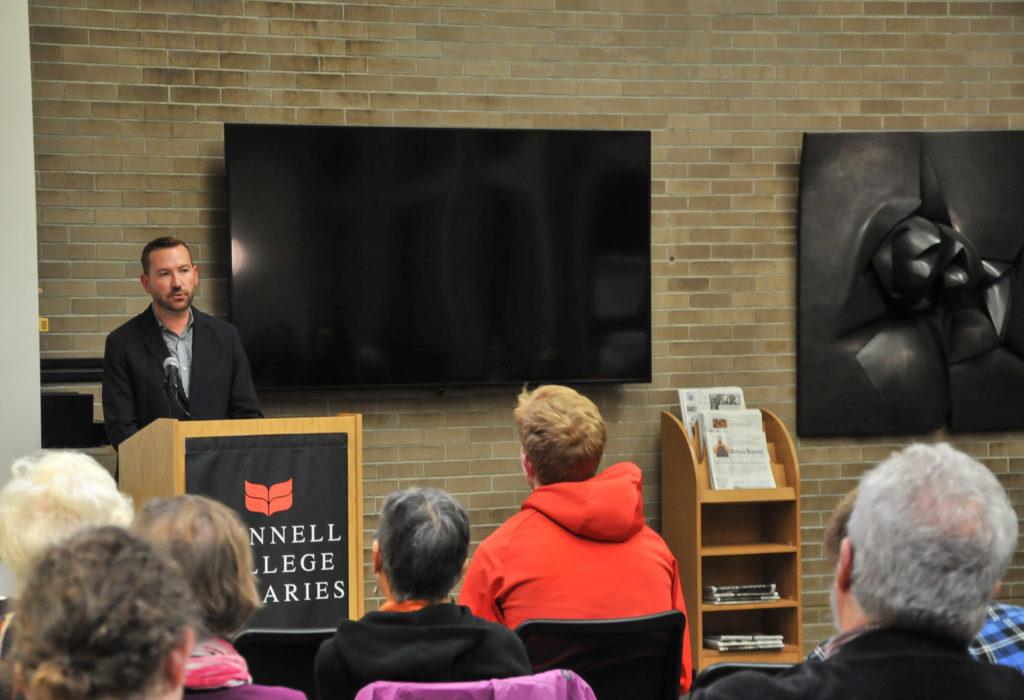By Clara Larson
larsoncl@grinnell.edu
Josh Dorner ’03 gave a talk concerning the recent hearing regarding the potential appointment of Judge Brett Kavanaugh to the Supreme Court. Well before the official 8pm start time on Oct. 1, the first floor of Burling was packed full of students, faculty and community members.
Dorner studied political science and went on to work for advocacy organizations and policy campaigns. His resume includes a significant extent of progressive public service.
The American public’s prevailing interest in the Kavanaugh hearings has generally revolved around one central issue: sexual assault allegations brought forward by Dr. Christine Blasey Ford, Deborah Ramirez and Julie Swetnick. Dorner, however, mentioned the allegations only a few times throughout his talk. Instead, Dorner contextualized the significance of the Kavanaugh hearings within recent Supreme Court history, and explained how Kavanaugh’s nomination reflects both established political trends and changing ones.
According to Dormer, Republicans and Democrats have each refused to appoint judicial nominations made by the opposing party for years. However, Dorner claimed “it’s undeniable that the Republicans turned it into an all-out war once Obama came into office.”
Dorner went on to cite that in the 42 years before Obama came into office, federal court nominations were filibustered on average less than once per year. However, in the first five years of Obama’s presidency, this happened 36 times, often limiting Obama’s ability to appoint judges to District Courts, Courts of Appeals and to the Supreme Court. In fact, Dorner noted that after Supreme Court Justice Scalia passed away, Republicans ensured his position remained empty for 422 days, long enough to make sure that Obama wouldn’t fill the seat.
Dorner argued that because of this “Supreme Court war” forged by Republicans, “Trump was really given a tremendous gift.” When Trump came into office, there were 112 vacant seats to fill. As of now, one eighth of all judges in federal courts were appointed by Trump.
It was this unique “gift” given to Trump, Dorner claimed, that set the scene for Kavanaugh’s nomination. Anticipating this ability to influence federal courts, Trump released a list of potential federal court nominees during his campaign, most chosen by private interest groups. Dorner asserted it was a strategic way of appealing to conservative voters. He explained that, for years, there has been a movement encouraging conservative voters to care about court nominations, emphasizing the ability of a strongly conservative court to further the Republican agenda.
In contrast, Dorner said, “it’s so very difficult to get progressive, democratic voters to care about the courts.” Until Kavanaugh’s nomination, Democrats have had little incentive to care about Supreme Court nominations.
Out of concern for Kavanaugh’s sexual assault allegations and worry for his potential influence on women’s reproductive rights, gun control and environmental regulations, Democrats have begun to oppose a judicial nomination much more strongly than they have in recent history. The forefront of the progressive opposition against Kavanaugh now consists of human rights groups, think tanks, women’s groups, civil rights groups and grassroots organizations, explained Dorner.
Although Kavanaugh’s stances on key issues may play a role in encouraging this progressive opposition, Dorner argued that many reasons remain as to why Kavanaugh should be objectively disqualified from serving on the Supreme Court.
“His allegations are very serious and disqualifying in and of themselves,” Dorner said, noting “his 27, easily well-documented lies [during the hearing].” He went on to list certain behaviors during the hearings and his record as further disqualifying factors.
Dorner noted that often, Democrats nominate candidates for their qualifications, while Republicans tend to nominate for ideology, over-looking whether or not the candidate is truly qualified. In reference to Kavanaugh’s nomination, he expressed that “there should be 10 reasons for someone to be on the Supreme Court, not just one.”
Unsurprisingly, Grinnell has been abuzz with strong reactions from students and faculty since the hearing. Brendan Hyatt ’21 came away from the hearing being “pretty sure he’s a rapist. That is my main concern. I hope the Democrats pack the courts.”
Jonathan Gomez ’21 agreed that “this specific nominee being so wrong for the job but still potentially being able to make it is really worrisome”
If these trends continue, and Republicans are able to increasingly make courts more conservative, Dorner predicted a grim future for the United State political system.
“It doesn’t matter what laws are being passed, they’ll eventually just be met by this judicial buzz-saw,” Dorner said.




















































